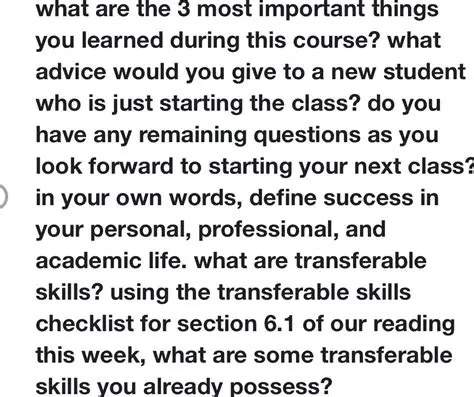College is a time of tremendous growth and learning. In addition to the academic knowledge you acquire, you’ll also develop important skills and life lessons. Here are some of the things you can expect to learn in college:

-
Critical thinking and problem-solving skills are essential for success in any field. In college, you’ll learn how to analyze information, identify problems, and develop creative solutions.
-
Communication skills are vital for both personal and professional success. In college, you’ll develop your written, verbal, and interpersonal communication skills.
Leadership skills are important for any role in which you’ll be managing or influencing others. In college, you’ll have many opportunities to develop your leadership skills through classes, clubs, and other activities.
-
Collaboration skills are essential for working effectively with others. In college, you’ll learn how to work with people from diverse backgrounds and perspectives.
-
Time management skills are essential for success in college and beyond. In college, you’ll learn how to manage your time effectively so that you can meet your academic and personal obligations.
-
Responsibility is an important life lesson that you’ll learn in college. In college, you’ll be responsible for your own learning and actions.
Ethics are the principles that guide our behavior. In college, you’ll learn about ethical principles and how to apply them to your own life.
-
Diversity is the recognition and appreciation of differences. In college, you’ll learn about different cultures, perspectives, and ways of life.
-
Global awareness is the understanding of the world beyond your own country. In college, you’ll learn about different countries, cultures, and global issues.
-
Sustainability is the practice of meeting the needs of the present without compromising the ability of future generations to meet their own needs. In college, you’ll learn about sustainability and how to live a sustainable lifestyle.
Technology skills are essential for success in today’s world. In college, you’ll learn how to use technology effectively for learning, communication, and productivity.
Personal development is an important part of the college experience. In college, you’ll learn more about yourself and your interests. You’ll also develop your values, beliefs, and goals.
Common Mistakes to Avoid
Here are some common mistakes to avoid in college:
- Procrastination is the habit of putting off tasks until later. Procrastination can lead to stress, anxiety, and poor grades.
- Overwhelming yourself is another common mistake. Don’t try to take on too many classes or activities at once. Start with a manageable schedule and add more as you can handle it.
- Ignoring your health is a mistake that can have serious consequences. Eat healthy foods, get enough sleep, and exercise regularly.
- Getting caught up in the party scene is a mistake that can sidetrack your studies. Don’t let partying get in the way of your education.
- Giving up is the biggest mistake of all. Don’t give up on your dreams. If you’re struggling, reach out for help.
How to Take the Most Advantage of College
Here are some tips for taking the most advantage of college:
- Get involved. Get involved in classes, clubs, and other activities that interest you. This is a great way to meet new people, learn new things, and make memories that will last a lifetime.
- Take advantage of resources. Colleges offer a variety of resources to help students succeed. These resources include tutoring, counseling, and career services. Take advantage of these resources whenever you need them.
- Study smart. Don’t just cram for exams. Study regularly and use active learning techniques to improve your retention.
- Get enough sleep. Sleep is essential for both physical and mental health. Get 7-8 hours of sleep each night so that you can be alert and focused during the day.
- Eat healthy foods. Eating healthy foods will help you stay energized and focused. Avoid sugary drinks and processed foods. Instead, eat plenty of fruits, vegetables, and whole grains.
- Take care of your mental health. College can be stressful. It’s important to take care of your mental health by talking to a counselor or therapist if you’re feeling overwhelmed.
Here are some frequently asked questions about college:
- What is the best way to prepare for college? There are a few things you can do to prepare for college. First, take challenging courses in high school. Second, get involved in extracurricular activities. Third, develop good study habits.
- How much does college cost? The cost of college varies depending on the school you attend. However, you can expect to pay between $10,000 and $50,000 per year for tuition and fees.
- What are the benefits of going to college? There are many benefits of going to college. College graduates earn more money than people with only a high school diploma. College graduates are also more likely to have jobs that require critical thinking and problem-solving skills.
- What are the challenges of going to college? There are some challenges to going to college. College can be expensive. College can also be stressful. However, the benefits of going to college outweigh the challenges.
- How can I get help paying for college? There are a number of ways to get help paying for college. You can apply for scholarships, grants, and loans. You can also work part-time or take out student loans.
- Where can I get academic support in college? Colleges offer a variety of academic support services to help students succeed. These services include tutoring, counseling, and writing centers.
